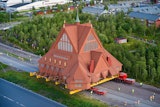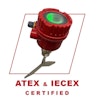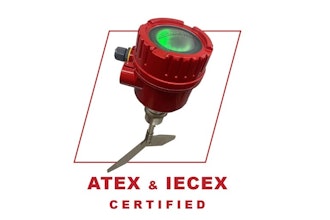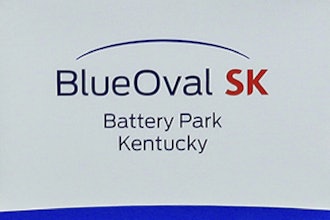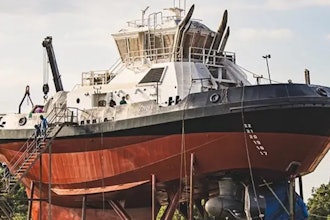Industrial fans need to be constructed of quality materials for long life and durability. Nowhere is this more important than in the meat processing facilities where fans are washed down on a daily basis. Long hours, high humidity and caustic chemicals all take a toll on fans used in these environments. This is why it is important to choose the right fan for your food processing application.
Many meat processing facilities use wall or ceiling mounted circulation fans to cool employees and create a more comfortable work place from the the heat and humidity from the carcass, hot water or processing equipment. Unfortunately, most companies choose the wrong fan for this application. A common circulation fan is made with powder coated steel guards, aluminum fan blades and a standard duty motor. While this may be a quality fan, the humidity in the environment and the chemicals used to pressure wash the fans will eat away at the metal. In addition, the nightly cleaning process with pressure washers are very harsh on the fan motors and the common fan is not equipped with a wash down duty motor.
Rusty fans are a nightmare for meat processing companies. There is a great expense in wire brushing and repainting the fans on a weekly basis. Some companies choose to consistently replace rusty fans which also increases the equipment and maintenance costs. Yet another option is to stock extra fan components and replace those parts as they go bad or rust starts to show. But, the worst possible scenario is the USDA fining you or shutting your plant down if they find rusty fans above food product. Rusty metal that could flake off and fall into a food product is a major concern.
Costly maintenance expenses and possible fines can be avoided by choosing the correct fan for your environment. Food processing facilities with high humidity and a nightly wash down regiment should install a high quality fan designed to last in that application. There are several options to choose from when you decide to buy the proper fan. The fan should use materials such as aluminum, polypropylene, stainless steel or another non-corrosive material. Another detail to look for is if the motor is rated for a “wash down duty” environment. The correct motor will be engineered to withstand being sprayed with a pressure washer and to operate in a high humidity environment. It is common for these motors to come without a wire and plug so that the electrician can fit the wires with water proof connectors. One should also ensure that the wall or ceiling brackets and fasteners being used to hang the fans are also made of non-corrosive materials such as stainless steel.
A standard concern regarding using a “wash down duty” fan is the cost. A good quality all stainless steel fan, for example, will likely cost more than the common “off the shelf” fan. When comparing these products the maintenance manager or purchasing agent should also factor in the labor cost to upkeep the common fan. If you add up fan replacement, repair, refurbishment and labor costs for the common fan you would be surprised. Many companies don’t realize how many fans they repair or throw away over the course of a year. These costs could be offset by investing in the proper fan which will provide years of reliable air movement.
When choosing the proper equipment for your food processing facility cost, quality and durability should be considered. Fans are no exception. Choosing the proper fan for your food processing application is an important step in ensuring employee comfort, reducing maintenance costs and increasing overall efficiency.
About the Author
Jason Prom is Regional Sales Manager at Schaefer Ventilation Equipment. He can be reached by phone: 800-779-3267 x129 or email: [email protected]
